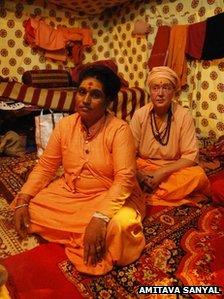Kumbh Mela: India's Hindu Naga nuns get their own space
- Published
.jpg)
The women of the Juna Akhara now have their own space and facilities at the Kumbh Mela
For the first time, women ascetics from the elite Hindu Naga - meaning naked - holy order have won the right to have their own separate camp at the Kumbh Mela, the world's largest gathering, in Allahabad, India. Amitava Sanyal reports from Allahabad.
Called the Juna Sannyasini Akhara, or the Juna Nuns' Order, the women religious have their own distinguishing pennant, an anointed leader and a separate enclosure at the Kumbh Mela.
The new order is from among the Naga monks, who control the religious affairs at the world's biggest gathering and have the right to remain naked. (Naga is derived from the Sanskrit for naked, "nagna", and is different from the Naga tribes of north-eastern India.)
The Naga order is a highly secretive and closed group. Its initiation and rites are not divulged to the public.
Earlier, the few women among this overwhelmingly male world of the Hindu holy orders were organised under various men's camps at the Kumbh, which is a festival held every 12 years and whose recorded history stretches back at least 1,000 years.
The women had to defer to the men for leadership and received inferior treatment in terms of basic amenities at the festival.
'New markers of identity'
Now, they have their own leader, are given more space and resources and have access to separate toilets; entry to the women's enclosure is strictly monitored by the police.
.jpg)
Devya Giri, the leader of the Juna women's order, is a trained laboratory technician
"We are still coming to terms with the new markers of identity," says Devya Giri, leader of the women's order.
The 35-year-old, who earned a post-graduate degree as a medical technician from the Institute of Public Health and Hygiene in Delhi before being ordained in 2004, adds with a hint of subversion: "We are thinking of doing some things differently. For one, though the presiding deity of the Juna Order for men is Dattatreya, (a three-faced minor god) we are thinking of incorporating Dattatreya's mother Anusuya as our presiding deity."
Sorting out gods is one thing - fixing gender issues on Earth is quite another.
Recently Corinne "Coco" Leyre, from France, was initiated as a monk of the women's order in a secret ceremony.
"Things are not equal between the men and women's orders yet. We still have to depend on the men for the big decisions, like when our tents will be put up," says the soft-spoken, saffron-clad 45-year-old.
Ms Leyre, who took the monastic name of Sangam Giri, was the first initiate who chose all her gurus - a Naga monk has five gurus that he or she can choose - from among women.
"These women have grown up depending on their fathers, husbands or sons all their lives. They often wait for things to happen to them, which we in the West are not used to," Nicole Jaquis, a filmmaker from New York who has known the nuns since 2001 and who acts as a liaison officer for some of them, tells me.
More than three-fourths of the women at the Juna Sannyasini Akhara hail from Nepal, where widows from the upper castes are encouraged not to remarry.
Rather than going back to their parents, a large number of them turn to asceticism.
There is another unmistakable gender-defined difference within the Naga orders.

Frenchwoman Sangam Giri chose her own gurus
Unlike the monks, the nuns are asked not to be seen naked in public, though these ones have the right to do so.
Prahlad Giri, 70, recalls that in all her years as a Naga nun, she has seen only one woman, Brahma Giri, who used to stay naked at all times and, as a mark of defiance, kept "two silver swords by her side".
Brahma Giri has passed away and now no one is allowed to stay naked, especially on the all-important auspicious bathing days at the Kumbh Mela.
A day before the first big dip, someone from the Juna men's order asked Devya Giri to ensure there were no naked bathers among the nuns.
So unlike most of the men, the women take to the waters wrapped in a single piece of unstitched cloth.
"How can we allow it? It's not in Indian tradition to allow women to stay naked. It would bring on us a curse if we did," says Hari Giri, secretary general of the Juna order.
He says he worked towards granting the women their own pennant because "this is a democracy and the women had been asking for it for a long time".
- Published20 January 2013
- Published19 January 2013
- Published14 January 2013
- Published14 January 2013